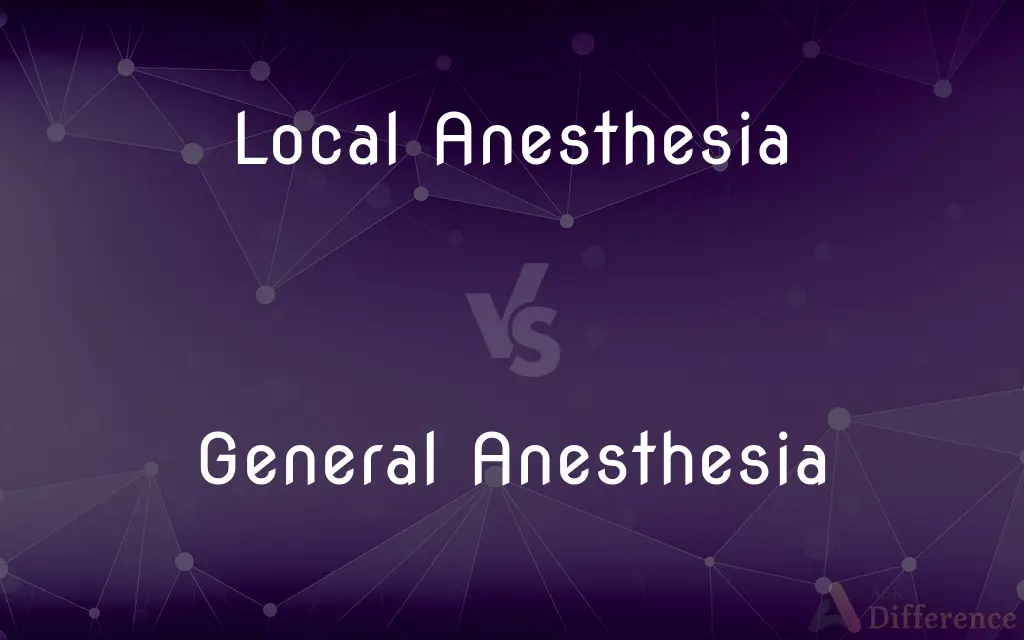Local Anesthesia vs. General Anesthesia — What's the Difference?
Edited by Tayyaba Rehman — By Fiza Rafique — Published on January 16, 2024
Local anesthesia numbs a specific area, while general anesthesia induces unconsciousness and a lack of sensation throughout the body.

Difference Between Local Anesthesia and General Anesthesia
Table of Contents
ADVERTISEMENT
Key Differences
Local anesthesia is a type of anesthesia used to numb a small, specific area of the body. A patient under local anesthesia remains fully conscious and aware of their surroundings but does not feel pain in the area being treated.
General anesthesia is used for major surgeries and procedures where it is beneficial for the patient to be completely unconscious. It affects the entire body, causing loss of consciousness, sensation, and reflexes.
Local anesthesia is administered either by injection or topically and works by blocking nerve signals in the specific area. This targeted approach is less invasive and patients recover quickly, often without the need for an extended hospital stay.
General anesthesia, on the other hand, is typically administered via inhalation or intravenous (IV) drugs and affects the patient's entire body. It requires close monitoring of vital signs, as it depresses normal physiological functions.
Both local anesthesia and general anesthesia have their specific indications, benefits, and risks. Local anesthesia is commonly used for minor outpatient procedures, while general anesthesia is reserved for more extensive or invasive surgeries.
ADVERTISEMENT
Comparison Chart
Scope
Numbs a specific area.
Induces full-body unconsciousness.
Consciousness
Patient remains conscious.
Patient is unconscious.
Method of Administration
Injection or topical.
Inhalation or intravenous (IV).
Recovery Time
Usually rapid.
May be prolonged.
Procedure Suitability
Minor surgeries or dental work.
Major surgeries requiring immobility.
Compare with Definitions
Local Anesthesia
A drug applied to a body part to prevent pain without affecting consciousness.
She received local anesthesia before the skin biopsy.
General Anesthesia
A drug-induced state that ensures a patient is completely unaware of the surgery.
During the procedure, general anesthesia ensured she felt no pain.
Local Anesthesia
A topical or injected anesthetic for minor surgical procedures.
Local anesthesia was administered at the site of the laceration.
General Anesthesia
A mix of inhaled gases and intravenous medications to prevent pain and awareness.
The patient was placed under general anesthesia before the operation started.
Local Anesthesia
An anesthetic method where only a small part of the body is numbed.
After local anesthesia, he felt no pain during the stitching.
General Anesthesia
A medically induced coma with loss of protective reflexes.
General anesthesia was required for her knee replacement surgery.
Local Anesthesia
Medication that causes loss of sensation in a localized area.
The dentist used local anesthesia to numb my gums before the procedure.
General Anesthesia
Medication that brings about unconsciousness for surgical procedures.
He was under general anesthesia for the duration of the heart surgery.
Local Anesthesia
A temporary blockage of nerve impulse transmission in a specific area.
The surgeon used local anesthesia to excise the mole on my back.
General Anesthesia
Full-body anesthesia resulting in a temporary suspension of consciousness.
General anesthesia made sure the patient slept through the surgery.
Common Curiosities
What is local anesthesia used for?
Local anesthesia is used to numb a small area for minor surgeries and dental procedures.
Why would a doctor choose general anesthesia?
A doctor would choose general anesthesia for procedures that are lengthy, complex, or would otherwise be uncomfortable.
How does general anesthesia work?
General anesthesia works by rendering a patient unconscious and unresponsive to pain.
Is local anesthesia safer than general?
Local anesthesia is generally considered safer due to less impact on overall body functions.
Can you eat before local anesthesia?
Typically, you can eat before receiving local anesthesia unless otherwise instructed.
How long does general anesthesia last?
General anesthesia lasts for the duration of the surgery, but its effects may linger for hours afterward.
What are the risks of local anesthesia?
Risks of local anesthesia include allergic reactions and, rarely, nerve damage or infection.
Can local anesthesia be used for childbirth?
Yes, epidural and spinal blocks are forms of local anesthesia used for pain relief in childbirth.
Can local anesthesia cause side effects?
Side effects of local anesthesia are usually mild and can include numbness and tingling.
Is general anesthesia necessary for all surgeries?
No, general anesthesia is not necessary for all surgeries; some can be done with local or regional anesthesia.
How is local anesthesia administered?
Local anesthesia is administered either through injections near the site of surgery or topically on the skin.
What's the recovery time for general anesthesia?
Recovery time varies but usually includes hours in the hospital and possibly days at home.
Can you drive after local anesthesia?
Most patients can drive after local anesthesia, assuming they are not taking sedative medications.
Do you breathe on your own under general anesthesia?
Typically, a breathing tube is used because general anesthesia can depress natural breathing.
How is general anesthesia given?
General anesthesia is given through inhalation of gases or intravenous (IV) drugs.
Share Your Discovery

Previous Comparison
Bullet Liner vs. LineX Spray
Next Comparison
Strong Bases vs. Weak BasesAuthor Spotlight
Written by
Fiza RafiqueFiza Rafique is a skilled content writer at AskDifference.com, where she meticulously refines and enhances written pieces. Drawing from her vast editorial expertise, Fiza ensures clarity, accuracy, and precision in every article. Passionate about language, she continually seeks to elevate the quality of content for readers worldwide.
Edited by
Tayyaba RehmanTayyaba Rehman is a distinguished writer, currently serving as a primary contributor to askdifference.com. As a researcher in semantics and etymology, Tayyaba's passion for the complexity of languages and their distinctions has found a perfect home on the platform. Tayyaba delves into the intricacies of language, distinguishing between commonly confused words and phrases, thereby providing clarity for readers worldwide.
















































